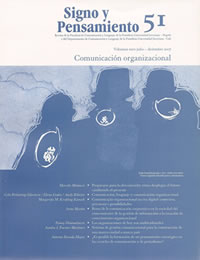Abstract
The excessive growth of communication and journalism schools during the last decade in Latin America has brought about a new and urgent reflection on education, so that a closer relation can be established between what students learn in the classroom and what the social, political and economic context is demanding for this century from schools and universities and their graduates. It seems that such a relation can become effective through the development of particular competences that provide new communicators and journalists with strategic thinking. This kind of thinking is focused on students’ ability to interpret, judge and assess reality, based on a solid knowledge of their fields of study; it also enables students to analyze and interact with their environment, and provides them with necessary tools to envisage transformations of their reality and make them possible and feasible. In other words, an education whereby students develop strategic thinking in communication implies helping them to develop the ability to interpret (hermeneutic reading), to interact (dialogue with), and to transform their context. In short, the hypothesis upheld in the article is that it is possible to educate new communicators and journalists capable of changing their reality, based on the development of strategic thinking in communication. Education for transformation is the key.This journal is registered under a Creative Commons Attribution 4.0 International Public License. Thus, this work may be reproduced, distributed, and publicly shared in digital format, as long as the names of the authors and Pontificia Universidad Javeriana are acknowledged. Others are allowed to quote, adapt, transform, auto-archive, republish, and create based on this material, for any purpose (even commercial ones), provided the authorship is duly acknowledged, a link to the original work is provided, and it is specified if changes have been made. Pontificia Universidad Javeriana does not hold the rights of published works and the authors are solely responsible for the contents of their works; they keep the moral, intellectual, privacy, and publicity rights.
Approving the intervention of the work (review, copy-editing, translation, layout) and the following outreach, are granted through an use license and not through an assignment of rights. This means the journal and Pontificia Universidad Javeriana cannot be held responsible for any ethical malpractice by the authors. As a consequence of the protection granted by the use license, the journal is not required to publish recantations or modify information already published, unless the errata stems from the editorial management process. Publishing contents in this journal does not generate royalties for contributors.


